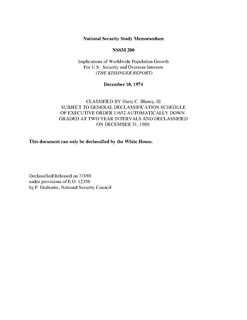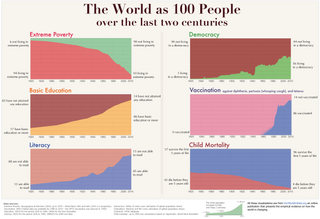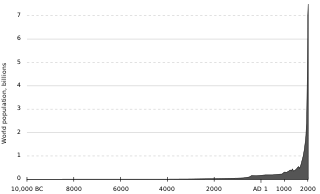 W
WIn demographics, the world population is the total number of humans currently living, and was estimated to have exceeded 7.9 billion people as of November 2021. It took over 2 million years of human prehistory and history for the world's population to reach 1 billion and only 200 years more to grow to 7 billion.
 W
WWorld Population Day is an annual event, observed on July 11 every year, which seeks to raise awareness of global population issues. The event was established by the Governing Council of the United Nations Development Programme in 1989. It was inspired by the public interest in Five Billion Day on July 11, 1987, the approximate date on which the world's population reached five billion people. World Population Day aims to increase people's awareness on various population issues such as the importance of family planning, gender equality, poverty, maternal health and human rights.
 W
WHuman overpopulation is the concept of a human population becoming too large to be sustained by its environment or resources in the long term. The idea is usually discussed in the context of world population, though it may also concern regions. Human population growth has increased in recent centuries due to medical advancements and improved agricultural productivity. Those concerned by this trend argue that it results in a level of resource consumption which exceeds the environment's carrying capacity, leading to population overshoot. The concept is often discussed in relation to other population concerns such as demographic push and depopulation, as well as in relation to resource depletion and the human impact on the environment.
 W
WWorld population milestones went unnoticed until the 20th century, since there was no reliable data on global population dynamics.
 W
WNational Security Study Memorandum 200: Implications of Worldwide Population Growth for U.S. Security and Overseas Interests (NSSM200), also known as the "Kissinger Report", was a national security directive completed on December 10, 1974 by the United States National Security Council under the direction of Henry Kissinger following initial orders from President of the United States Richard Nixon.
 W
WOur World in Data (OWID) is a scientific online publication that focuses on large global problems such as poverty, disease, hunger, climate change, war, existential risks, and inequality. It is a project of the Global Change Data Lab, a registered charity in England and Wales, and founded by Max Roser, a social historian and development economist. The research team is based at the University of Oxford.
 W
WSustainable population refers to a proposed sustainable human population of Earth or a particular region of Earth, such as a nation or continent. Estimates vary widely, with estimates based on different figures ranging from 0.65 billion people to 98 billion, with 8 billion people being a typical estimate. Projections of population growth, evaluations of overconsumption and associated human pressures on the environment have led to some to advocate for what they consider a sustainable population. Proposed policy solutions vary, including sustainable development, female education, family planning and broad human population planning.
 W
WThe Valeriepieris circle is a South China Sea-centered circular region on the world map that is about 4,000 kilometers (2,500 mi) in radius and contains more than half the world’s population. It was named after the Reddit username of Ken Myers, a Texas ESL teacher who first drew attention to the phenomenon in 2013. The map became a meme and was featured in numerous forms of media.